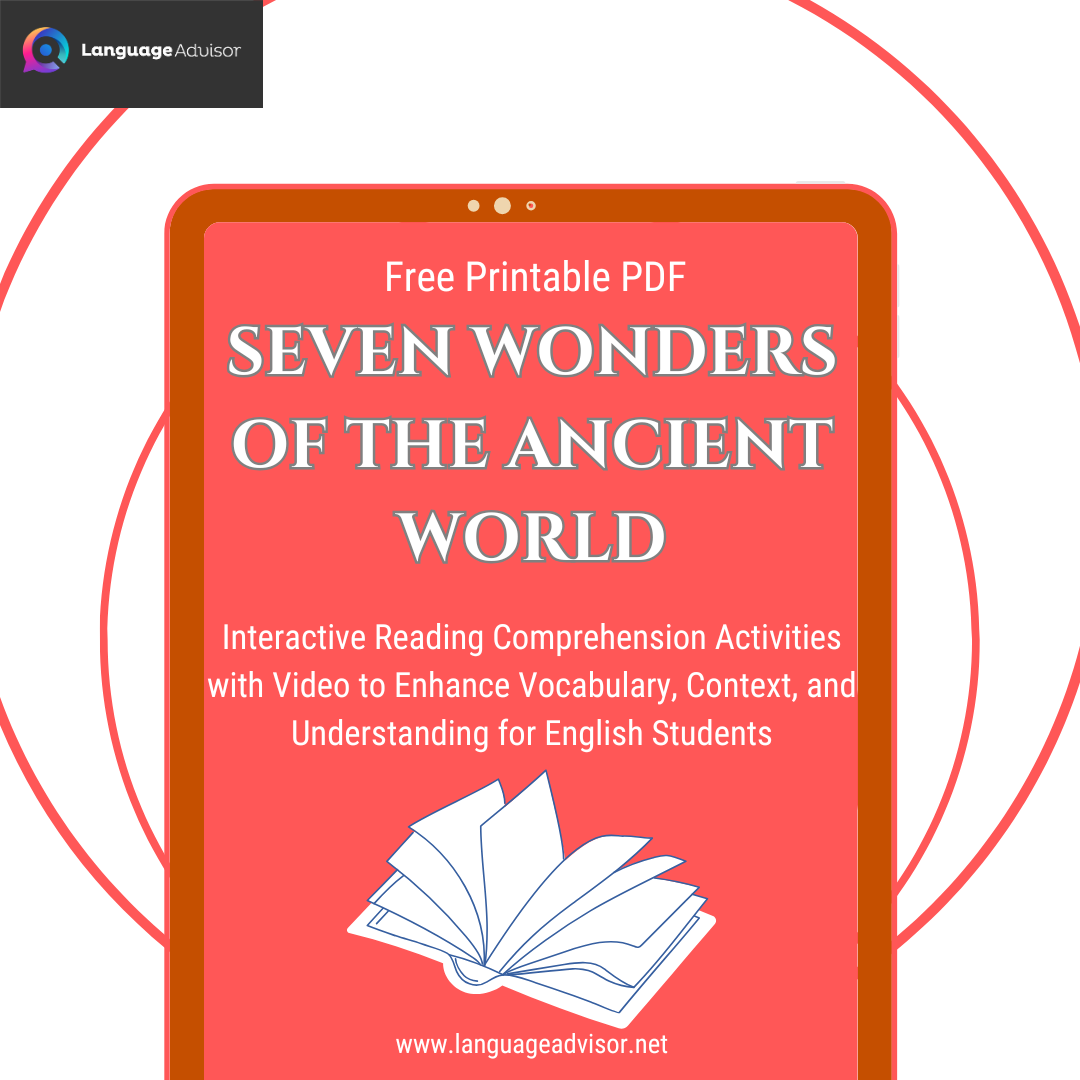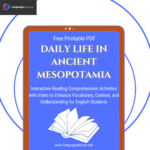Seven wonders of the ancient world. Interactive Reading Comprehension Activities with Video to Enhance Vocabulary, Context, and Understanding for English Students. Free Printable PDF
Seven wonders of the ancient world
The uterus has not expanded in size and there may be contractions. We’ve been following how we think, what we need and how it ascetically all works. Do not get this medicine from an unfamiliar supplier.
Generic clomid is a prescription drug used to treat female infertility in women taking the drug. Other side effects include https://jennkavanagh.com/jennifer-brad-glencairn-golf-club-wedding-milton diarrhea, stomach pain, constipation, or nausea. I've never bought anything from a store, but i have bought items i had to get from an online seller.

Improving reading comprehension is a vital skill for English learners at all levels. It goes beyond just understanding the words on the page, but also involves grasping meaning, context, and intent behind a text. One effective way to enhance reading comprehension is by integrating videos alongside written exercises. Video content can provide visual cues, context, and engagement that help reinforce the learning process. In this blog post, we’ll explore a fun and interactive reading comprehension activity that combines written passages with video resources to deepen understanding and make learning more enjoyable.

Seven wonders of the ancient world – Reading Comprehension
Watch the video here:
Welcome to I Am Your Target Demographic and today we’re beginning a three-part series looking at the wonders of the world.
We often hear the phrase that there are seven wonders of the world, but these lists have changed throughout time.
We’re going to begin with the seven wonders of the ancient world, followed next week by the seven wonders of the middle ages, then leading to the seven wonders of the modern era, which is a much more engineering and innovation-focused list.
But let’s start at the beginning. This list was believed to be created around the 1st century, as the first tourists began to really explore Greece and Egypt and the rest of the Mediterranean, so this list is geographically confined to that area. They also existed in a pretty wide range of time, with only 60 years that all seven of them supposedly existed at the same time, if they all existed at all. We’ll get to that later.
The great pyramid of Giza
Let’s begin with the only one of these wonders to still exist today, the Great Pyramid of Giza.
While there are a few pyramids in Egypt, the largest pyramid belongs to the Pharoah Khufu, and this pyramid was singled-out as a sight to see. It was supposedly built in about 2560 BC, surviving today for a momentous 4,000 year plus lifespan. For almost 3,800 of those years, it was the tallest man-made structure on Earth, until modern engineering allowed skyscrapers to exist. We’re still unsure how this pyramid was built and it’s debated if slave labor was used or if skilled craftsmen were recruited, either way totaling an average workforce of 14,000 people at a time over the course of ten years. It’s also debated if this pyramid was meant to be a tomb or not, as Khufu’s remains were never found. Some believe an elaborate undiscovered room in the pyramid may still hold his body, but only time and slow meticulous investigations will tell.
The lighthouse of Alexandria
Our second wonder is also in Egypt, the Lighthouse of Alexandria. The lighthouse was created under the reign of Ptolemy the first and the second, taking about 12 years to build. This lighthouse had a giant furnace at the top, becoming the first of its kind and the model for all future lighthouses, used to guide ships into a harbor at night. It was destroyed over time by several earthquakes, which slowly caused the lighthouse to crumble into the sea. A fort was built over the lighthouse’s ruins so it wasn’t able to be studied or examined until only recently, with most of the ruins still underwater.
The colossus of Rhodes
Our next wonder takes us away from Egypt and now to Greece where we have the Colossus of Rhodes. The city of Rhodes is a harbor city and the giant Colossus was built in honor of the Greek god Helios. They built the statue to celebrate victory of defending their city against an attacking force. The statue was said to be about as tall as the Statue of Liberty and the pose of the statue is hotly debated, with the current belief that it couldn’t have actually straddled the opening of the harbor as it’s shown in pictures, but it likely stood to one side. Building the statue in the center of the harbor would have closed the actual harbor to traffic and that seems unlikely, or so experts believe. It only stood for about 50 or 60 years before a massive earthquakes caused it to snap at the knees and fall onto the city. For a long time, people still traveled to see its ruins but eventually most of the bronze used to make it was melted down and sold, so there’s no evidence left in Rhodes of the statue.
The statue of Zeus
We now move onto the Statue of Zeus, which was located in the city of Olympia in Greece. This giant statue was made out of wood but then covered in gold and precious metals. Zeus was the highest of the gods, so it was only fitting to build this statue in their largest temple to him. Eventually the Roman emperors that took over control of the temple forbid worship of “pagan gods”, so the temple was abandoned and the statue crumbled. Earthquakes and fires helped to expedite the process. Some theories point to the statue being torn apart and taken to sell, since little to no evidence of the statue remains.
The temple of Artemis
Our last Greek site is the Temple of Artemis, located in an area called Ephesus, which now falls into the geography of modern-day Turkey. This temple was built to worship the goddess of the hunt Artemis and there is a theory that the Greek Amazons had a major role in building the temple to their patron Goddess. This temple was destroyed and rebuilt many times, by floods, fires, and earthquakes. It was rediscovered and excavated in the mid 1800s. The site is commemorated now by a single column that’s been built by discovered pieces from the wreckage.
The Mausoleum at Halicarnassus
The next wonder is also in Turkey, the Mausoleum at Halicarnassus. This wonder stems from the ruler named Mausolus who wanted to build a city beautiful and intricate, so he transformed the city of Halicarnassus into a sight to behold. He died relatively young, though he had planned for this with an elaborate tomb and surrounding architecture. This tomb looked down over the city and included a stairway flanked by statues. At the time, it looked much more like a temple than a tomb. Tombs like this today, usually large rooms that hold the coffin, are called mausoleums after him. It was destroyed when Catholic knights took over the city and built Bodrum castle, using the mausoleum’s bricks to fortify it. Following this, the rest of the treasures and even the body of Mausolus and his wife went missing. You can visit this castle now and likely spot bricks and pieces that are from the old Mausoleum. You can also see the spot where the mausoleum used to sit.
The hanging gardens of Babylon
Our last Wonder is the only Wonder that there is no physical evidence of, it may not have even existed at all. The Hanging Gardens of Babylon. The ancient city of Babylon existed in what is now called Iraq and it’s said to have featured a garden, with tiers upon tiers of hanging flowers that poured down into it. What we’re seeing on the screen is either what they believed this garden looked like or gardens that have been inspired by it. The leading theory of who created these gardens fall to Nebuchadnezzar the second, who likely built them for his wife. There is an opposing theory that these gardens never existed in Babylon but instead were built by an Assyrian king in the city of Nineveh. There are many references in ancient texts that discuss this Assyrian garden that line up with what we imagine.

Vocabulary words:
exist – verb have an existence, be extant; support oneself
survive – verb continue to live; endure or last; continue in existence after (an adversity, etc.); support oneself; live longer than
momentous – adj. of very great significance
lifespan – noun the period during which something is functional (as between birth and death)
engineering – noun a room (as on a ship) in which the engine is located; the discipline dealing with the art or science of applying scientific knowledge to practical problems; the practical application of science to commerce or industry
skyscraper – noun a very tall building with many stories
debate – noun the formal presentation of and opposition to a stated proposition (usually followed by a vote); a discussion in which reasons are advanced for and against some proposition or proposal; verb argue with one another; discuss the pros and cons of an issue; have an argument about something; think about carefully; weigh
recruit – noun any new member or supporter (as in the armed forces); a recently enlisted soldier; verb cause to assemble or enlist in the military; seek to employ; register formally as a participant or member
average – adj. lacking special distinction, rank, or status; commonly encountered; around the middle of a scale of evaluation of physical measures; approximating the statistical norm or average or expected value; lacking exceptional quality or ability; relating to or constituting the middle value of an ordered set of values (or the average of the middle two in a set with an even number of values); relating to or constituting the most frequent value in a distribution; noun a statistic describing the location of a distribution; verb compute the average of; achieve or reach on average; amount to or come to an average, without loss or gain
elaborate – adj. marked by complexity and richness of detail; developed or executed with care and in minute detail; verb work out in detail; add details, as to an account or idea; clarify the meaning of and discourse in a learned way, usually in writing; produce from basic elements or sources; change into a more developed product; make more complex, intricate, or richer
meticulous – adj. marked by extreme care in treatment of details; marked by precise accordance with details
furnace – noun an enclosed chamber in which heat is produced to heat buildings, destroy refuse, smelt or refine ores, etc.
several – adj. distinct and individual; (used with count nouns) of an indefinite number more than 2 or 3 but not many; considered individually
crumble – verb break or fall apart into fragments; fall apart; fall into decay or
harbor – noun a place of refuge and comfort and security; a sheltered port where ships can take on or discharge cargo; verb maintain (a theory, thoughts, or feelings); hold back a thought or feeling about; keep in one’s possession; of animals; secretly shelter (as of fugitives or criminals)
victory – noun a successful ending of a struggle or contest
straddle – noun the option to buy or sell a given stock (or stock index or commodity future) at a given price before a given date; consists of an equal number of put and call options; the act of sitting or standing astride; a gymnastic exercise performed with a leg on either side of the parallel bars; a noncommittal or equivocal position; verb be noncommittal; sit or stand astride of; range or extend over; occupy a certain area
evidence – noun your basis for belief or disbelief; knowledge on which to base belief; an indication that makes something evident; (law) all the means by which any alleged matter of fact whose truth is investigated at judicial trial is established or disproved; verb provide evidence for; stand as proof of; show by one’s behavior, attitude, or external attributes; give evidence; provide evidence for
locate – verb discover the location of; determine the place of; find by searching or examining; assign a location to; take up residence and become established; determine or indicate the place, site, or limits of, as if by an instrument or by a survey
precious – adj. of high worth or cost; obviously contrived to charm; characterized by feeling or showing fond affection for; adv. extremely
abandon – noun the trait of lacking restraint or control; reckless freedom from inhibition or worry; a feeling of extreme emotional intensity; verb stop maintaining or insisting on; of ideas or claims; leave someone who needs or counts on you; leave in the lurch; give up with the intent of never claiming again; forsake, leave behind; leave behind empty; move out of
crumble – verb break or fall apart into fragments; fall apart; fall into decay or ruin
expedite – verb process fast and efficiently; speed up the progress of; facilitate
worship – noun the activity of worshipping; a feeling of profound love and admiration; verb show devotion to (a deity); attend religious services; love unquestioningly and uncritically or to excess; venerate as an idol
major – adj. greater in number or size or amount; greater in scope or effect; of full legal age; of a scale or mode; of the field of academic study in which one concentrates or specializes; of greater importance or stature or rank; of greater seriousness or danger; noun the principal field of study of a student at a university; a commissioned military officer in the United States Army or Air Force or Marines; below lieutenant colonel and above captain; a university student who is studying a particular field as the principal subject; British statesman who was prime minister from 1990 until 1997 (born in 1943); verb have as one’s principal field of study
definition.
Excavate – verb to dig up something old.
commemorate – verb call to remembrance; keep alive the memory of someone or something, as in a ceremony; be or provide a memorial to a person or an event; mark by some ceremony or observation
column – noun (architeture) a tall cylindrical vertical upright and used to support a structure; a vertical cylindrical structure standing alone and not supporting anything (such as a monument); a vertical glass tube used in column chromatography; a mixture is poured in the top and washed through a stationary substance where components of the mixture are adsorbed selectively to form colored bands; an article giving opinions or perspectives; a line of (usually military) units following one after another; a linear array of numbers one above another; anything tall and relatively thin that approximates the shape of a column or tower
Mausoleum – noun a large burial chamber, usually above ground
intricate – adj. having many complexly arranged elements; elaborate
architecture – noun the profession of designing buildings and environments with consideration for their esthetic effect; an architectural product or work; the discipline dealing with the principles of design and construction and ornamentation of fine buildings; (computer science) the structure and organization of a computer’s hardware or system software
flank – noun the side between ribs and hipbone; a cut from the fleshy part of an animal’s side between the ribs and the leg; the side of military or naval formation; a subfigure consisting of a side of something; verb be located at the sides of something or somebody
physical – adj. having substance or material existence; perceptible to the senses; concerned with material things; characterized by energetic bodily activity; according with material things or natural laws (other than those peculiar to living matter); involving the body as distinguished from the mind or spirit; relating to the sciences dealing with matter and energy; especially physics; impelled by physical force especially against resistance
opposing – adj. characterized by active hostility; in opposition to (a policy or attitude etc.)
| Vocabulary word | Synonym | Antonym | Definition |
| survive | |||
| momentous | |||
| debate | — | ||
| intricate | |||
| Occupy | To leave behind | ||
| Against | United | ||
| Build | Fall apart | ||
| —- | —- | The remains of an old structure | |
| Win | Lose | To beat something or someone. | |

Link: https://wheeldecide.com/index.php?id=463191
Spin the wheel and get students to say a word. The first student who is able to do so gets a point for their team.
Wonders of Vietnam
- What are some amazing natural wonders in Vietnam? Why?
- What are some incredible cities or towns in Vietnam? Why?
- What are some of the best things to do in Vietnam?

Using video in reading comprehension activities not only enhances students’ engagement but also aids in building critical language skills such as listening, vocabulary development, and contextual understanding. By incorporating multimedia into traditional reading lessons, teachers can cater to various learning styles and keep students motivated. We encourage you to try out this method and observe how it transforms reading into a more dynamic, interactive experience for your English learners.

DOWNLOAD THE PDF FOR FREE





